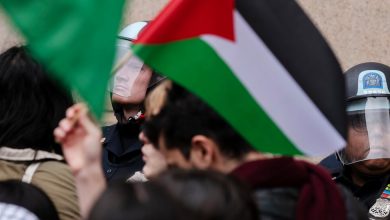An unspoken result of Biden’s meeting with Prince Mohammed: A setback in the Khashoggi case.

Since entering the White House, President Biden had refused to meet with, and even speak to, Crown Prince Mohammed bin Salman, the de facto ruler of Saudi Arabia, seeking to punish him with ostracism for the grisly murder of the Saudi journalist Jamal Khashoggi by Saudi agents in 2018.
But that objection fell by the wayside on Friday when Mr. Biden and Prince Mohammed met face-to-face during Mr. Biden’s first trip to Saudi Arabia for a regional summit focused on oil and Iran.
The two leaders briefly discussed the case, according to U.S. and Saudi officials, but effectively agreed to disagree on Prince Mohammed’s culpability before announcing a slew of initiatives aimed at emphasizing the close partnership between their countries.
And with that, the last high-level effort to hold Prince Mohammed accountable for the murder ended.
The two leaders’ conversation happened behind closed doors, and slightly different accounts emerged.
Mr. Biden told reporters that he had confronted Prince Mohammed privately about what he called an “outrageous” killing at the start of their meeting, even telling the prince that Mr. Biden held him responsible for it.
President Biden’s Visit to the Middle East
The U.S. president is on a four-day trip to Israel and Saudi Arabia, after branding the latter country a “pariah” state following the brutal assassination of Jamal Khashoggi, a Saudi Arabian journalist.
- Warm Welcome in Israel: Upon his arrival in the country, President Biden received the sort of rapturous welcome he could only dream about in Washington.
- Iran Nuclear Deal: President Biden’s push for the 2015 deal’s revival during his visit underscored divisions among Israeli security officials over the issue.
- Biden’s Saudi Lesson: After trying to isolate Crown Prince Mohammed bin Salman over human rights abuses, President Biden has changed approach. Here’s why.
“I made my view crystal clear,” Mr. Biden said.
Separately, Adel al-Jubeir, the Saudi minister of state for foreign affairs, described to reporters a less contentious exchange about human rights in which the killing was briefly mentioned.
Calling the killing “a terrible mistake,” Mr. al-Jubeir said that those responsible for the crime had been punished, that the United States and Saudi Arabia had moved on, and that the United States was in no position to criticize, recalling the torture of detainees in Iraq’s Abu Ghraib prison by American troops.
Mr. Khashoggi was one of Saudi Arabia’s highest-profile journalists and was for years considered a palace insider who could effectively explain the kingdom’s point of view.
But after Prince Mohammed came to power 2015, Mr. Khashoggi criticized the prince’s lack of tolerance for dissenting views and, fearing arrest, fled to the United States, where he wrote columns for The Washington Post that critiqued the prince’s initiatives.
In October 2018, Mr. Khashoggi entered the Saudi consulate in Istanbul to obtain documents that he needed to marry his Turkish fiancée. He never came out.
Turkish officials and a United Nations investigator later detailed how he had been confronted by a hit squad dispatched from Saudi Arabia that strangled him and injected him with a tranquilizer, killing him. A forensic doctor then dismembered his body and a body double wandered around Istanbul, wearing Mr. Khashoggi’s clothes in a failed attempt to convince the world that he was still alive.
For weeks, Saudi officials denied that the kingdom was behind his crime, but the perpetrators were caught on camera and identified, and some were closely linked to Prince Mohammed.
Saudi officials eventually acknowledged Mr. Khashoggi’s murder, but insisted that it had been carried out by rogue agents with no such orders from Riyadh.
Although Prince Mohammed said he had no foreknowledge of the plot, the murder left a deep stain on his efforts to bill himself as a forward-looking reformer. A Saudi trial that found eight men guilty in connection with the killing did little to quell international outrage.
The killing of Mr. Khashoggi was a primary reason that Mr. Biden vowed during his election campaign to treat the Saudis “like the pariah that they are.”
In the White House, he authorized the release of a C.I.A. assessment saying that the prince had authorized the operation that led to Mr. Khashoggi’s death. Mr. Biden also refused to speak with Prince Mohammed, saying that his own counterpart was the king.
Until Friday, that is, when Mr. Biden sat down with Prince Mohammed to discuss oil supplies, regional security and other issues.



